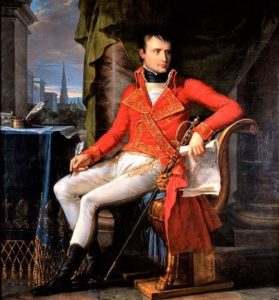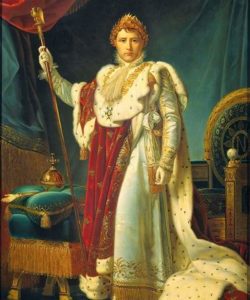Napoleon Bonaparte is also known as Napoleon I was born on August 15, 1769, in Ajaccio, in Corsica as Napoleon Bonaparte. Coming from a Corsican family, Bonaparte rose in the army during the French Revolution. He proved to be a first-rate military talent. The campaigns in Italy and Egypt made him particularly popular.
This enabled him to take power in France through the coup of 18th Brumaire VIII (November 9, 1799), initially as one of three consuls. From 1799 to 1804 as the first consul of the French Republic and then until 1814 and again in 1815 as emperor of the French, he became a dictatorial regime with plebiscitary Elements.
Through various reforms – such as those of the judiciary through the civil code or those of the administration – Napoleon has shaped the state structures of France to the present day and initiated the creation of modern civil law in occupied European countries. In terms of foreign policy, he temporarily gained control of large parts of continental Europe, supported by the army.
From 1805 he was also King of Italy and from 1806 to 1813 protector of the Confederation of the Rhine and appointed family members and confidants as monarchs in several other countries. Through the dissolution of the Holy Roman Empire initiated by him In 1806, the state of Central Europe became a central issue in the 19th century.
While he had initially spread the idea of the nation-state outside of France, the success of this idea made it particularly difficult to maintain the Napoleonic order in Europe, especially in Spain, Germany, and finally also in Russia.
The catastrophic outcome of the campaign against Russia from 1812 onwards shook his rule over large parts of Europe, the wars of liberation, and ultimately the fall of Napoleon. After a brief period of exile to Elba, he returned to power for a hundred days in 1815. In the Battle of Waterloo, he was finally defeated and exiled to the island of St. Helena until the end of his life.
Early Life of Napoleon Bonaparte
Napoleon was born on August 15, 1769, in Ajaccio, capital of present-day Corsica, into a large family of eight brothers. Five of them were boys: Joseph, Napoleon, Lucien, Luis, and Jerónimo. The girls were Elisa, Paulina, and Carolina.
Thanks to the greatness of the future Emperor Napoleone Bonaparte (as they called it in their vernacular), all of them were going to accumulate honors, wealth and fame, and also indulge in a thousand follies.
The mother of the Bonaparte brothers (or, with her Italianized last name, Buonaparte) was called María Leticia Ramolino and she was a woman of remarkable personality, whom Stendhal would praise for her firm and ardent character in his Life of Napoleon (1829).
Carlos María Bonaparte, the father, always with economic burdens due to his uncertain scores in the legal profession, endured thanks to the possession of some lands, proved to have few aptitudes for practical life. His difficulties were exacerbated by taking sides for the nationalist cause of Corsica against his new metropolis, France.
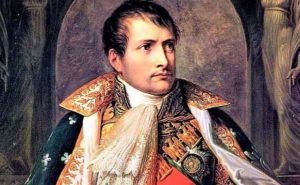
Gathered around a national hero, Pasquale Paoli, Carlos María Bonaparte supported the islanders who defended independence with arms and who ended up being defeated by the French in the battle of Ponte Novu, a meeting that took place in 1769, the same year in which Napoleon was born.
Due to the defeat of Paoli and the persecution of his side, Napoleon’s mother had to face the painful incidents of escaping the abrupt island during her first births; of her thirteen children, only those eight survived.
Subjugated the revolt, the French governor Charles Louis de Marbeuf, count of Marbeuf, played the card to attract the patrician families of the island. Carlos María Bonaparte, who religated his pretenses of belonging to the small nobility with ancestors in Tuscany, took the opportunity: he traveled with a recommendation from Marbeuf to the metropolis to prove his nobility and managed to get his two eldest sons, Joseph and Napoleon, to enter as fellows at the Colegio de Autun.
Napoleon’s school merits in mathematics, which he was very fond of and which came to constitute in him a kind of second nature (very useful for his future military specialty, artillery), facilitated his entry into the Brienne Military School.
From there he left at the age of seventeen with the appointment of second lieutenant and a garrison post in the city of Valence. In those years, the boy presented a semi-wild aspect and hardly spoke anything other than the dialect of his longed-for island.
His companions, sons of the French aristocracy, saw in him a strange and poorly dressed foreigner, who was the target of all kinds of ridicule; however, his wild and violent character commanded respect both from his comrades and from his teachers. What was most striking was his temperament and tenacity;
Revolutionary youth
Shortly after, the death of the father ensued and, for this reason, the transfer of Napoleon Bonaparte to Corsica and the temporary loss of active service. His hectic youthful stage ran between comings and goings in France, new cantonments with the troops (this time in Auxonne), the whirlwind of the French Revolution (whose violent explosions he met during a stay in Paris) and the independence conflicts in Corsica.
In the hectic confrontation of the island gangs, Napoleon Bonaparte created irreconcilable enemies, including Pasquale Paoli himself. The independence leader had been amnestied in 1791 and appointed governor of the Corsican city of Bastia; two years later, however, he would break with the Republican Convention and proclaim independence, while the then young officer Napoleon Bonaparte opted for the Frenchified factions.
Mistrust of the Bonaparte family towards the Panelists had gradually turned into furious animosity. Napoleon rose by intrigues with the militia headquarters and wanted to machine-gun his adversaries in the streets of Ajaccio. But he failed and had to flee with his own, to escape the fire in his house and almost certain death at the hands of his enraged compatriots.
Installed with his mother and his brothers in Marseilles, he suffered from great economic hardships, which at times touched the edge of misery; the horizon of family availability used to end in the pawnshops, but the Bonapartes were not without courage or resources.
María Leticia Ramolino, the mother, became the lover of a wealthy merchant, François Clary. The older brother, Joseph Bonaparte, married a daughter of the merchant, Marie Julie Clary; Napoleon’s courtship with another daughter, Désirée Clary, did not prosper.
However, the hardships only began to subside when a brother of Robespierre, Augustine, gave him his protection. Napoleon managed to rejoin the ranks with the rank of captain and gained wide renown on the occasion of the siege of the Toulon naval base (1793), where he managed to quell a counterrevolutionary uprising supported by the English.
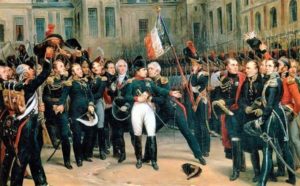
His was the plan of assault proposed to inexperienced generals, based on an intelligent distribution of artillery, and also the execution and the resounding final success. In recognition of his merits, he was promoted to brigadier general, assigned to the general artillery command in the Italian army, and traveled on a special mission to Genoa.
Those contacts with the Robespierre were on the verge of being fatal to him when the Jacobin Terror fell on July 27, 1794 (the 9th of Termidor in the republican calendar): Napoleon was imprisoned for a time in the fortress of Antibes, while his suspect was being clarified filiation.
Released through another Corsican, the commissioner of the Convention Salicetti, the young Napoleon Bonaparte, twenty-four years old and without office or benefit, started again in Paris, as if starting from scratch.
He found a hole in the topographic section of the Operations Department. In addition to the strictly technical tasks, carried out between maps, reports, and military secrets, this office made it possible to deal directly with the high civil authorities that supervised it.
And through these authorities, it was possible to access the halls where political machinations and financial speculations, in the murky splendor that had succeeded Robespierre’s implacable moralism, were intermingled with love affairs and nostalgia for the uses of the Old Regime.
There Napoleon met a refined widow with a reputation as brilliant as she was equivocal, Josefina de Beauharnais, who also filled her sentimental void. Empress Joséphine (such was her maiden name) was a native Creole lady from Martinique who had two children, Hortensia and Eugene, and whose first husband, the viscount and general of Beauharnais had been guillotined by the Jacobins.
Much later, Napoleon, who declared that he had no deep affection for anything or anyone, would confess to having passionately loved Josefina, five years his senior.
Among the lovers of Josefina Bonaparte was Paul Barras, the strong man of the Directory emerged with the new republican Constitution of 1795, who was at that time in search of a sword (according to his literal expression) to handle conveniently to defend the withdrawal conservative of the republic and steal it from the continuous coup attempts of the royalists, the Jacobins, and the egalitarian radicals.
At the end of 1795, the election of Napoleon Bonaparte was precipitated by one of the fearsome insurrections of the popular masses of Paris, to which the monarchists joined with their own destabilizing ends. Responsible for suppressing it, Napoleon carried out an operation of encirclement and annihilation with cannon shots that left the capital flooded with blood.
Assured the internal tranquility for the moment, Paul Barras entrusted him in 1796 to direct the war on one of the most unassisted republican fronts: that of Italy, in which the French fought against the Austrians and the Piedmontese.
A few days before his departure, Napoleon married Josefina in a civil ceremony, but in his absence, he could not prevent her from relinquishing herself to Paul Barras and other members of the government circle. Jealous and tormented, Napoleon ended up claiming her imperiously at his side, on the same battle stage.
The successful military Traning
From March 1796 until April 1797, the military genius of the young Buonaparte was revealed on the Italian peninsula; Lodi (May 1796), Arcole (November 1796) and Rivoli (January 1797) went down in history as the scenes of the main battles in which he defeated the Austrians; Beaulieu, Wurmser, and Alvinczy were the most outstanding marshals whose troops were swept away by those of Napoleon Bonaparte.
The inexperienced general who arrived from Paris in the spring of 1796 aroused the admiration of all the masters of the strategy of the time and became a record time in terror of the Austrian armies.
As for his own soldiers, the suspicion of the early days soon turned to enthusiasm: they began admiringly calling him “le petit caporal” and chanting his name before starting the fight. It was in those victorious days that Napoleon varied the spelling of his last name in his reports to the Directory: Buonaparte finally gave way to Bonaparte.
That twenty-seven-year-old general transformed a ragged, hungry, and demoralized body of men into a formidable war machine that crushed Piedmont in less than two weeks and, from victory to victory, repelled the Austrians beyond the Alps.
His campaigns in Italy would become a compulsory subject of study in the military academies during innumerable promotions, but as much or more significant than his overwhelming victories was his political reorganization of the Italian peninsula, which he carried out by recasting secular divisions and the old states in newly minted republics dependent on France.
The ray of war was thus revealed simultaneously as the genius of peace. What was most disturbing was the autonomous nature of his management: he made and undone according to his own criteria and not according to the guidelines of Paris.
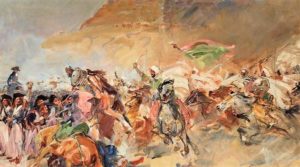
The Directory began to get irritated. When Austria was forced to ask for peace in 1797, strict control over a caudillo raised to the status of legendary hero was no longer possible. Napoleon displayed a threatening propensity to be the sword he executes, the government he administers, and the head that plans and directs: three people in the same nature of unequaled efficacy.
For this reason, the Directory considered the possibility of avoiding this threat by accepting its plan to cut the vital routes of British power (specifically, the one that linked the Mediterranean and India) with an expedition to Egypt.
Thus, on May 19, 1798, Napoleon sailed for Alexandria, and two months later, in the battle of the Pyramids, he dispersed the caste of mercenary warriors who exploited the country in the name of Turkey, the Mamluks, to later go into the Syrian desert.
But all their chances of success were collapsed when the French squadron was sunk in Abu Qir by Admiral Horacio Nelson, Napoleon’s English emperor on the naval stages.
The setback left him isolated and consumed with impatience at the fragmentary news he received from the continent. In Europe, the second coalition of the monarchical powers had recovered the conquests of Italy, and the French internal policy boiled of conspiracies and candidates to assault a State in which the only stabilizing force that remained was the army.
Finally, Napoleon decided to return to France in the first ship that could escape the Nelson blockade. No one dared to judge him for desertion and abandonment of his troops; He landed on the way on his native island and repeated once more the journey from Corsica to Paris, now as an undisputed hero.
Napoleon Bonaparte First Consul
In a few weeks, he organized the coup d’etat of November 9, 1799 (on Brumaire 18 according to the nomenclature of the republican calendar), for which he had the collaboration, among others, of Emmanuel Joseph Sieyès and his brother Luciano, the which helped him to dissolve the Legislative Assembly of the Council of Five Hundred, in which he appeared as president.
The coup swept the Board, its former protector Paul Barras, the Council of Elders, the last revolutionary clubs and all existing powers, and established the Consulate: a provisional government shared in theory by three incumbents, but in reality coverage of its autocratic regime, sanctioned by the new Napoleonic Constitution of the year 1800.
Approved under the slogan “The Revolution is over,” the new Constitution restored universal suffrage, which had been cut by the Directory’s oligarchy after the fall of Robespierre. In practice, calculated institutional mechanisms blinded the effective channels of real participation to the voters, in exchange for giving them the freedom to ratify the fait accompli in an enthusiastic plebiscite.
The one who validated Napoleon’s ascension to First Consul at the end of provisionality cast less than two thousand negative votes among several million ballots. The Consulate ended with a long stage of anarchy and disorder.
As soon as he had all the power in his hands, Napoleon showed that he was not only a bold general, concerned with manipulating the complex springs of international politics through diplomacy or war but also interested in providing welfare for his subjects and could act as a brilliant legislator and administrator.


